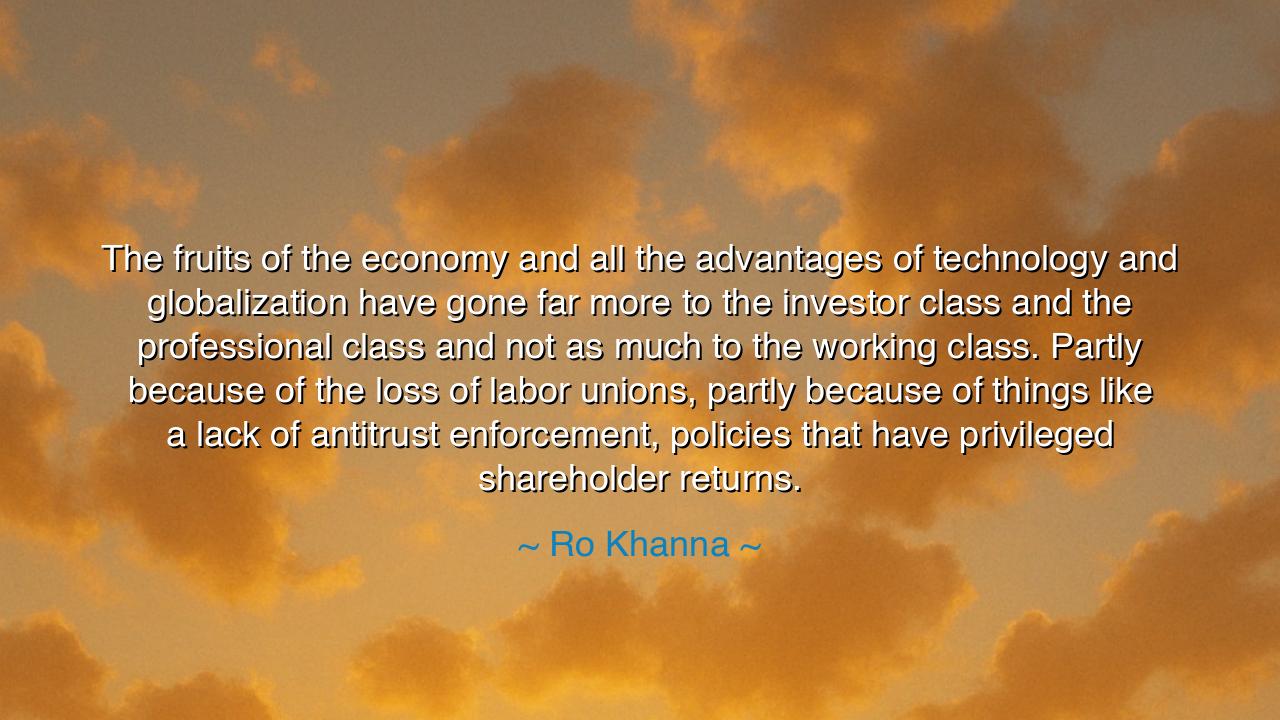
The fruits of the economy and all the advantages of technology
The fruits of the economy and all the advantages of technology and globalization have gone far more to the investor class and the professional class and not as much to the working class. Partly because of the loss of labor unions, partly because of things like a lack of antitrust enforcement, policies that have privileged shareholder returns.






Hear, O seekers of justice, the words of Ro Khanna, who lifted his voice against imbalance in the modern age: “The fruits of the economy and all the advantages of technology and globalization have gone far more to the investor class and the professional class and not as much to the working class. Partly because of the loss of labor unions, partly because of things like a lack of antitrust enforcement, policies that have privileged shareholder returns.” In these words, plain and powerful, lies a warning, a lament, and a call: that the abundance of our time has not been shared equally, and that the roots of fairness must be tended anew lest the tree of society bear only bitter fruit.
For he speaks of the fruits of the economy, the wealth that springs from machines, markets, and global trade. These fruits—greater than at any point in history—should nourish all who labor. Yet, as Khanna declares, they fall mostly into the baskets of the investor class and the professional class, while the working class, who sow and reap with their sweat, receive but the leftovers. This is not fate, but choice, shaped by policies and by power. And where choice has gone astray, choice can yet be corrected.
Consider, O listener, the days of the Gilded Age in America. Then too, titans of industry grew fat with railroads, steel, and oil, while workers toiled in misery, bound by long hours and meager pay. In time, the people rose: strikes spread, unions formed, and antitrust laws were forged to shatter monopolies. Out of that fire came the eight-hour day, safety standards, and the first taste of fairness for labor. Khanna names this history when he speaks of the loss of labor unions and the decline of antitrust enforcement—for these guardians once shielded the working man, and their absence leaves him vulnerable once more.
His words also expose the hidden idol of our age: the privileging of shareholder returns above all else. Corporations, once built to provide goods, services, and livelihoods, have been reshaped into engines of profit for the few. Decisions are measured not by how they nourish the worker or the community, but by how they fatten quarterly earnings. In such a world, the soul of labor is diminished, and the dignity of work is cast aside.
Yet history also offers hope. Recall the New Deal of Franklin Roosevelt, when after the Great Depression, policies were forged to lift the poor, regulate the powerful, and restore balance between capital and labor. Out of despair came renewal, and out of renewal came decades of prosperity that were shared more widely. Khanna’s voice echoes this lineage: a reminder that justice is not beyond reach, but demands courage, vision, and the will to act for the many, not only the few.
What lesson, then, must we take from this? That fairness in an economy does not grow by accident; it must be cultivated like a garden. Without unions, without antitrust laws, without the watchful eye of justice, the strong will consume the weak, and wealth will pool like stagnant water. To restore balance, people must unite, laws must serve the common good, and power must be checked by responsibility.
Therefore, O children of tomorrow, carry this teaching as torch and shield: do not be lulled into believing inequality is natural or unchangeable. Demand policies that honor the worker. Support movements that bind voices together in solidarity. Challenge the idols of unchecked profit, and remember always that technology and globalization, like fire, can warm all or burn all—depending on how they are governed. For only when the fruits of the economy are shared widely will the tree of progress stand strong against the storms of history.






AAdministratorAdministrator
Welcome, honored guests. Please leave a comment, we will respond soon